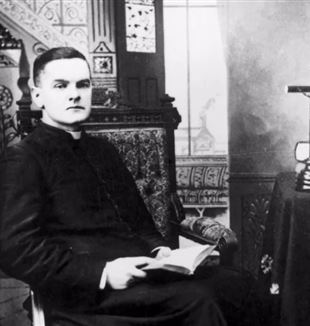
A New Blessed for a Local Church
Paul shares how he has discovered a compelling witness in Knights of Columbus Founder Michael J. McGivney.Pope Francis recently approved the miracle attributed to the intercession of Father Michael Joseph McGivney, thus paving the way to his beatification, which will take place on October 31 in Hartford, Connecticut, my hometown and the site of my school of community. It is a moment to reflect a little on the meaning of this man’s life for the Church in America and for ourselves.
Michael McGivney was born in Waterbury, Connecticut, to Irish immigrant parents; his family counted thirteen children, three of whom became priests in what was known then as the Diocese of Hartford. The time had hardships. This was just prior to the Civil War, and millions of Catholic immigrants were struggling to overcome poverty and anti-Catholic prejudice.
Father McGivney spent his entire priesthood in parish ministry and died of pneumonia on August 14, 1890—two days after his 38th birthday—after falling ill amid a pandemic. He was a “missionary disciple,” one who, as Pope Francis noted, encounters the people as Christ did: personally and lovingly. McGivney’s ministry was collaborative in the building up of the local church according to the heart of Christ.
McGivney brought together the men of St Mary’s Church—the same place where our New Haven School of Community meets—to strengthen the faith, to act in charity with those in need, and to protect the future of families in crisis. This latter point was important to his vision because Father McGivney’s own family was threatened by the premature death of his father. Years later, he was able to create a mechanism for Catholics that would offer a death benefit to widows and families to keep families together and to remain in communion with the Catholic Church. The establishment of the Knights of Columbus in 1882 as a fraternal benefit society organized the laity around the controlling ideas of charity, unity, fraternity and patriotism.
Though local, McGivney’s vision is universal: in McGivney’s mind, love of God and love of neighbor framed Catholic life. But his spirituality was not merely activist. We know that as a young man and later as a priest, he spent time in daily personal and corporate prayer; he was committed to the contemplation of Divine Things so as to be in communion with God who is Father, Son and Holy Spirit. As Father Giussani has taught us, communion with God leads to our personal freedom in Christ. This is not a spirituality for the select few but one that grounds all the baptized.
The 19th century is not so very different from our own era when it comes to widespread anti-Catholic and anti-immigrant sentiment and the direct and indirect influence of anti-Christian secret societies and false ideologies. There was aggressive sectarian proselytism, and there was the danger of religious indifferentism and secularism—both of which still challenge us. Then, as now, there was a struggle to hand on the fullness of Catholic faith and to care for the poor and the stranger. Then, as now, the powerful and the privileged set the agenda for care and concern in ways that disregarded both Catholic truth and human dignity. Then, as now, there was a need for a proper Catholic love of our own country “follow[ing] from the duty of gratitude and belong[ing] to the order of charity” (Catechism of the Catholic Church, n. 2239).
McGivney was ahead of the times with his social awareness of the dignity of the human person, of the poor, and of the family. The Knights of Columbus, with their emphasis on charity and fraternity, set the stage for greater and holistic engagement in society in the post-industrial era. It was and is prompted by laymen—not the clergy—who care for the human person as imago Dei, in a living encounter with Christ.
Father Michael McGivney’s beatification for us in New Haven gives great joy. The fact that a native son is recognized is an assurance that no personal difficulty of mine is an impediment for God’s grace. The bishop of Bridgeport Frank Caggiano recently said that the timing of this beatification is an act of grace. As Saint Paul says to the Corinthians, “Behold, now is the acceptable time; behold, now is the day of salvation” (2 Cor 6:2). We must discern how can we serve our immigrants and the needy faithfully and fraternally in a time of personal and societal crisis. McGivney is a God-given model in faith and in carrying out the Apostle’s instruction: “So then, as we have opportunity, let us do good to all men, and especially to those who are of the household of faith” (Gal 6:10).
Father Michael McGivney is entombed in Saint Mary’s Church in New Haven, Connecticut.
Paul, New Haven, Connecticut